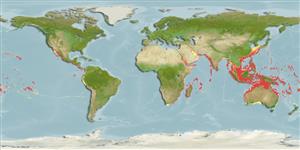>
Anguilliformes (Eels and morays) >
Muraenidae (Moray eels) > Muraeninae
Etymology: Gymnothorax: Greek, gymnos = naked + Greek, thorax, -akos = breast (Ref. 45335).
More on author: Rüppell.
Environment: milieu / climate zone / depth range / distribution range
Ecologie
marien rifbewoner; diepte 0 - 150 m (Ref. 1602). Tropical; 35°N - 36°S, 19°E - 77°W
Indo-Pacific: Red Sea and South Africa (Ref. 3257) eastward to the Tuamoto and Austral islands, north to the Ryukyu and Hawaiian islands, south to New Caledonia. Eastern Pacific: Costa Rica, Panama and the Galapagos (Ref. 9324). Southeast Atlantic: South Africa.
Lengte bij maturiteit / Grootte / Gewicht / Leeftijd
Maturity: Lm ?, range 65 - ? cm
Max length : 240 cm TL mannelijk / geslacht onbekend; (Ref. 48635)
Dorsale stekels (totaal) : 0; Dorsale zachte stralen (totaal) : 0; Anale stekels: 0; Anale zachte stralen: 0; Wervels: 132 - 140. Reddish eyes (Ref. 1602). Color yellowish, densely mottled with dark brown; front of head purplish grey; posterior margins of fins yellow-green; gill opening in a black blotch. Juveniles sometimes bright yellow with brown blotches (Ref. 48635).
Along drop-offs (Ref. 48635). Benthic (Ref. 58302). Occurs in coral or rocky areas of reef flats and protected shorelines to seaward reefs. Feeds on cephalopods (Ref. 30573), fishes, and crustaceans (Ref. 89972). Most often appears on the reef after a fish has been speared during daylight. The regularity and promptness of such appearances make it clear that G. flavimarginatus is especially sensitive to stimuli emanating from an injured or stressed fish (Ref. 13550). Eaten in some parts of the Indo-Pacific (Ref. 12484). Minimum depth reported taken from Ref. 128797. Solitary and curious, usually seen with head protruding (Ref 90102).
Levenscyclus en paargedrag
Maturiteit | Voortplanting | Paaien | Eieren | Fecunditeit | Larven
Chen, H.-M., K.-T. Shao and C.T. Chen, 1994. A review of the muraenid eels (Family Muraenidae) from Taiwan with descriptions of twelve new records. Zool. Stud. 33(1):44-64. (Ref. 6934)
Status op de Rode Lijst van het IUCN (Ref. 130435: Version 2024-1)
Gevaar voor de mens
Reports of ciguatera poisoning (Ref. 4690)
Gebruik door de mens
Visserij: commercieel; Aquarium: Commercieel
Tools
Speciale rapporten
Download XML
Internetbronnen
Estimates based on models
Preferred temperature (Ref.
123201): 23.7 - 29, mean 27.8 °C (based on 1990 cells).
Fylogenetische diversiteitsindex (Ref.
82804): PD
50 = 0.5000 [Uniqueness, from 0.5 = low to 2.0 = high].
Bayesian length-weight: a=0.00035 (0.00024 - 0.00052), b=3.36 (3.25 - 3.47), in cm total length, based on LWR estimates for this species & Genus-body shape (Ref.
93245).
Trofisch niveau (Ref.
69278): 4.2 ±0.72 se; based on food items.
Weerstandsvermogen (Ref.
120179): Zeer laag, minimale populatieverdubbelingstijd meer dan 14 jaar (Preliminary K or Fecundity.).
Fishing Vulnerability (Ref.
59153): Very high vulnerability (90 of 100).
Nutrients (Ref.
124155): Calcium = 14.6 [7.1, 24.7] mg/100g; Iron = 0.341 [0.190, 0.814] mg/100g; Protein = 18.9 [16.6, 21.5] %; Omega3 = 0.0968 [, ] g/100g; Selenium = 74.2 [35.8, 153.4] μg/100g; VitaminA = 38.1 [10.5, 142.9] μg/100g; Zinc = 0.716 [0.484, 1.021] mg/100g (wet weight);
